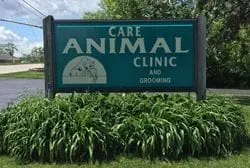
When most people think of who needs flea prevention, the family dog is at the top of the list, and often cats are forgotten or assumed to be flea free. Dogs are bathed more regularly than cats and when they scratch it’s much more obvious. Cats are very clean creatures; they groom themselves daily and often don’t show as many outward signs of a flea infestation as dogs.
While fleas are annoying and unsanitary; preventing the diseases they spread is a much more important reason for flea prevention for both the cat and for their families. Fleas feed on blood and breed very quickly and effectively. Young kittens are most at risk for developing anemia simply from being fed on by large numbers of fleas. It is important to address flea infestations early in young cats.
Fleas are the intermediate host for tapeworms and when a cat grooms, it ingests fleas and flea feces resulting in infection. The tapeworms develop into adults in the intestines. Tapeworms can cause no symptoms with very mild infestations to severe malnutrition and death with severe cases. Humans can also become infected with tapeworms through the flea.
Haemotrophic mycoplasma is a bacterial disease transmitted during the feeding process of the flea. It infects the red blood cells in cats and stimulates the cat’s own immune system to destroy those red blood cells. Infection can result in a severe and fatal anemia without treatment. Mycoplasma is most common in areas with lots of cats because the fleas transmit it cat to cat, however. Even cats that don’t socialize are at risk.
There are many flea prevention options available from your veterinarian. The most common are topical preparations applied one time monthly, however, there are other options including injections that last for months and oral medications. Some flea prevention kills adult fleas, others prevent fleas from breeding. It is important to discuss your individual cat's options based on his or her lifestyle and needs. It is also important not to use homeopathic/ herbal preparations without first discussing them with your veterinarian.


